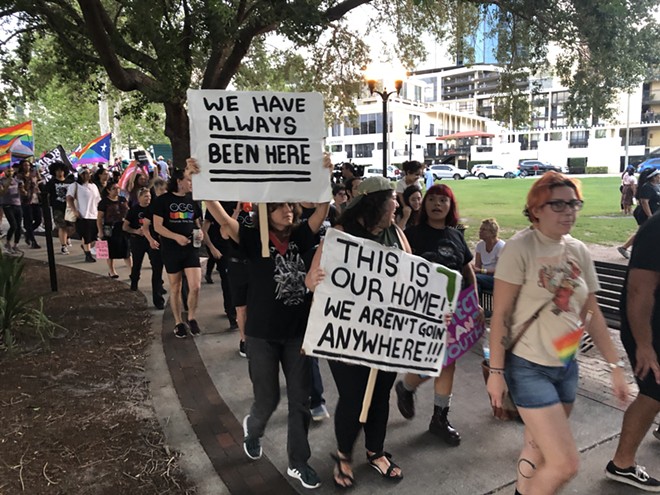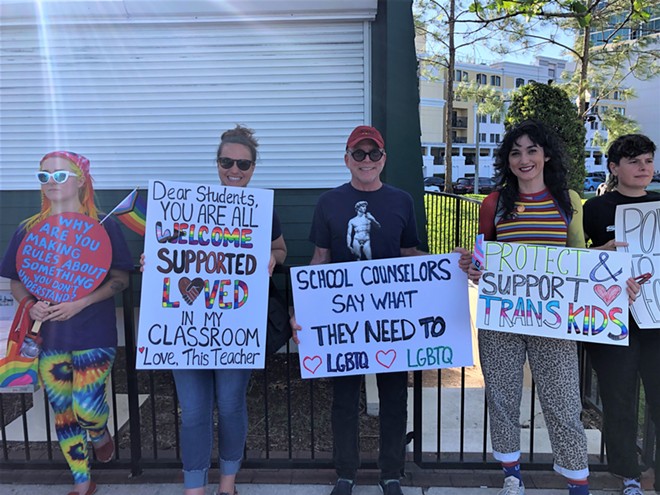at the behest of Gov. Ron DeSantis and corporate interests, hundreds rallied in Orlando on Monday to uplift calls to protect the dreams and freedoms of their communities.
The Orlando “March for Our Dreams and Freedoms,” was organized by a broad coalition of labor, social justice and immigrant rights groups at Lake Eola Park.
Less of a protest and more an act of peaceful resistance, the march was a celebration of the City Beautiful’s diversity of the arts — featuring poetic performance, youth theatrical performances, the Orlando Gay Chorus, dancers and local drag performer Angelica Sanchez.
But the stakes, towering higher than any downtown high-rise, were made clear.
“We’re here to say it is not OK to attack any community,” said Yasmin Flasterstein, co-founder and executive director of local nonprofit Peer Support Space.
As an immigrant and person of color, Flasterstein, who identifies as a nonbinary woman, acknowledged at the top of the event that there are multiple communities — from trans Floridians to immigrant communities — who could stand to suffer under legislation advanced by the state legislature’s Republican majority.
The path towards effective resistance is a collective fight, Flasterstein said.
“If your community is not under attack and you think it’s OK to attack other communities, your community could be next,” Flasterstein said.
“We’re here to fight for our collective liberation and to say it is not OK to attack our basic rights and our right to joy, health care, education.”
Hundreds from across the state gathered at the amphitheater in Lake Eola Park, with attendees ranging in age, race and ethnicity.
Many held signs admonishing Gov. DeSantis for fanning the flames of a manufactured culture war. Some signs simply expressed support for LGBTQ+ Floridians, as some families move to flee the state.
McKenna Schueler
Floridians march in support of LGBTQ+, immigrant and worker rights at May Day rally in Orlando.
Community organizers from across Florida traveled to join the event’s extensive lineup of speakers and performances, including advocates for reproductive justice and LGBTQ+ rights.
Florida’s six-week abortion ban, signed into law last month has not yet gone into effect, but it looms over the abortion care landscape as nonprofits like the Florida Access Network, Tampa Bay Abortion Fund and Stand With Abortion Now offer financial assistance to help people who are pregnant seek abortion care services.
Angelica Sanchez, a local drag queen and a survivor of the 2016 Pulse nightclub massacre, shouted from the stage, “Drag is not a crime!” referring to legislation (SB 1438) that aims to crack down on drag performances, under the guise of “protecting” children.
Due to the language of the bill, even Pride parades could be targeted. One parade on the Treasure Coast was already called off last month, and the bill has yet to be signed into law.
While some Florida Republicans have denied or avoided addressing their own attacks on LGBTQ people — through restrictions on gender affirming healthcare and censoring of LGBTQ-related instruction and books in schools — some lawmakers haven’t minced words.
Florida Rep. Webster Barnaby, R-Deltona, recently referred to trans people as “mutants,” “demons and imps” in discussion of an anti-trans bathroom bill.
On the floor of the Florida House on Monday, State Rep. Jeff Holcomb, R-Spring Hill, said, “Our terrorist enemies hate homosexuals more than we do,” in an apparent Freudian slip that speaks volumes.
At Monday’s rally, U.S. Congressman Maxwell Frost pointed out that in the past decade alone, Floridians have voted to approve medical marijuana legalization, voting rights restoration for felons and a $15 minimum wage by 2026.
How the same state can vote in — and vote to retain — expected presidential hopeful DeSantis as Florida governor, said Frost, is misinformation, gerrymandering and voter suppression.
“It’s politics over people,” the Congressman added.
The event, attended by members of various local unions in Central Florida, coincided with International Workers Day, which is more commonly known as May Day in the U.S.
“Today we’re coming together to show what the ‘us’ looks like, but also remember the sacrifices that so many have made so we can be here today,” said Felipe Sousa-Lazaballet, executive director of the Hope CommUnity Center, who helped host the event.
May Day commemorates over a century of working-class people — across racial and ethnic lines — coming together to organize for safe and just working conditions, drawing on socialist and anarchist principles.
While the United States today does not formally recognize International Workers Day as a holiday, unlike over 60 countries worldwide, it is its birthplace.
May Day was born out of organizing efforts in Chicago in 1884, when a convention of the Federation of Organized Trades and Labor Unions proclaimed that “eight hours shall constitute a legal day’s labor from and after May 1, 1886.”
As In These Times reports, an estimated 300,000 workers across the U.S. went on strike on May 1, 1886 in support of an eight-hour workday. Forty-thousand workers in Chicago alone struck, after two years of organizing efforts spearheaded by Lucy Parsons, a formerly-enslaved union organizer and writer, and her husband, Albert Parsons, also a radical union organizer.
Within days, Chicago police violently clashed with striking workers. And on May 4, 1886 a bomb explosion (the source of which is still unconfirmed today) capped a chaotic scene, today referred to as the Haymarket Riot or Haymarket Affair.
The explosion was blamed on eight radicals, including Albert Parsons. Six were immigrants, and seven were found guilty, according to In These Times. Four were executed by hanging, while one was found dead in his jail cell prior to execution.
Today’s labor movement, and that of the past, intersects with issues of racial justice, LGBTQ rights, and the rights of immigrants — who in 1886 and today make up a sizable percentage of the U.S. workforce, particularly within the agricultural, domestic, hospitality and service sectors.
Not by happenstance, agricultural workers and domestic workers were excluded from rights established under the National Labor Relations Act, passed in 1935. This exclusion was understood as a proxy for the exclusion of Black workers from federal labor protections, whereas today, it’s also immigrants who are highly concentrated in domestic and agricultural labor.
Working class people, history shows, can secure major gains for themselves and their families when they come together. This has made organized labor a target.
Just last week, Florida legislators approved a bill that’s designed to undercut most of Florida’s public sector unions, representing over 150,000 working Floridians statewide.
Unions that are known for supporting Republican candidates for office — police and firefighter unions — are carved out, although workers across party lines, including teachers, school counselors, 911 dispatchers, public works employees and more will nonetheless be affected, if signed into law by DeSantis.
At the same time, it’s not all doom and gloom.
Happy #MayDay or International Workers Day!
While Florida legislators just passed a bill that could hurt the state’s public sector unions, there have also been many notable instances recently of workers organizing and winning gains in Florida.
Follow along for a few examples🧵
— McKenna Schueler (@SheCarriesOn) May 1, 2023
An organized labor movement is still alive in Central Florida, even if less than 6% of the state’s workforce can boast union representation.
Thousands of workers at Orlando’s Walt Disney World just won a new contract delivering an $18 minimum wage this year and child bonding leave. Before that, workers at the Orange County Convention Center, employed by Sodexo, also won an $18 wage floor, up from $13 per hour, after threatening to go on strike.
In new organizing (a rarity), Starbucks workers in Oviedo voted to unionize last summer and are still fighting for a contract. Sodexo dining workers at Rollins College (many of whom are people of color and immigrants) just formally filed for a union election last month, despite alleged intimidation tactics by company management.
“I want people all around the world to know and to hear me: We will win,” said Chevalier Lovett of Florida Rising, while overlooking the crowd gathered in Orlando Monday evening.
“Our dreams are important and our freedoms matter.”


